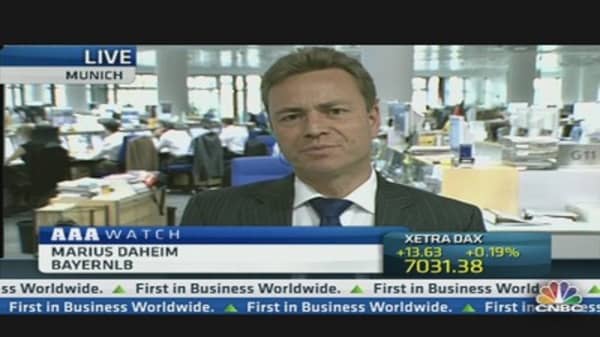Germany’s economic success relative to the rest of the euro zone is well documented – but the threat of further euro zone trouble could bring its triple-A rating into question.
Germany is the only major advanced economy which has managed to achieve a lower unemployment rate in the first half of 2012 than in 2007 before the global financial crisis.
Ratings agency Fitch reaffirmed its triple-A status earlier this month, and wrote admiringly of “Germany's longstanding credit strengths and robust economic performance over the past two years.”
However, rival Moody’s has changed its outlook on Germany to negative as of July, primarily over concerns about the rest of the euro zone.
Germany’s exports could benefit from a weaker euro if peripheral countries like Greece are able to stay within the single currency, and it has tried to ensure they do. The country is contributing 29 percent of the funds to the European Financial Stability Facility, so some would argue that they have a right to question how that money is being spent.
As the German government has consistently pointed out, despite a relatively healthy economy which grew by 0.3 percent between April and July, as the rest of the euro zone contracted, it does not have an unlimited pot to pay for the problems elsewhere in the euro zone.
“Since the very beginning of the crisis, the message from Germany has been clear; risk sharing will be available, but not without conditionality,” Michala Marcussen, head of global economics at Societe Generale, wrote in a research note.
The consequences can be seen in expected falls in profits at the Bundesbank, Germany’s central bank, over the next couple of years. According to the German Ministry of Finance, Bundesbank profits may amount to only 1.5 billion euros in 2012, and 2 billion euros in 2013, after rising provisions for risk related to the ECB and euro zone.
There are also threats to the safe haven status of German bunds (click here for more) that have sent yields into negative territory in recent months. According to HSBC, if there are further risks in the euro zone, some of this “safe-haven premium” could come out of the price, and five year yields could rise towards 1.0 percent and the 10 year to 1.8 percent (from around 0.47 percent and 1.55 percent respectively at the moment).
Written by Catherine Boyle, CNBC.com. Twitter: @catboyle01





